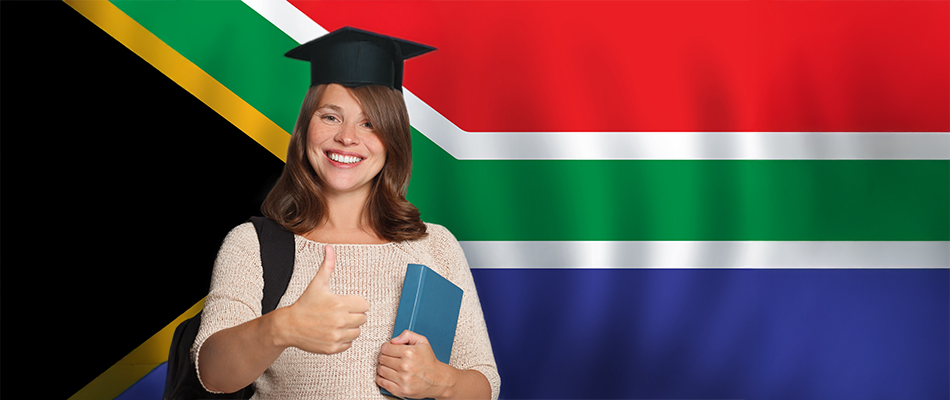South Africa has become a leading destination for postgraduate studies. It’s a combination of quality education, affordability, and career-relevant training that makes it a wise choice for advancing your qualifications. Why study a master’s in South Africa? The country offers globally recognised, CHE-accredited degrees that meet international standards. With vibrant research hubs, diverse academic disciplines, and flexible learning options, including online programmes, South Africa provides excellent opportunities for both local and international students.
This Article covers everything you need to know if you plan to study a master’s in South Africa, including programme types, entry requirements, funding options, and in-demand fields.
Table of Contents
- Why Study a Master’s in South Africa?
- Types of Master’s: Coursework, Research, and Mixed Routes
- Entry Requirements and Academic Checklist
- Choosing What to Study
- How to Choose an Online Master’s Degree in South Africa?
- Application Timeline and Practical Steps
- Why Choose a Regenesys Programme?
- Understanding the Costs of a Master’s in South Africa
- Conclusion
- Study Masters in South Africa – FAQ

Why Study a Master’s in South Africa?
Pursuing a master’s degree in South Africa offers numerous advantages, including affordable tuition fees, diverse research opportunities, and strong regional recognition. Degrees are accredited by the CHE and aligned with the National Qualifications Framework (NQF), ensuring they meet rigorous quality standards.
Additionally, South Africa’s universities are known for their expertise in fields like mining, public health, and renewable energy, making them attractive to students seeking specialised knowledge. The option to study a master’s in South Africa online further enhances accessibility for working professionals and international learners.
Here are some of the most critical benefits to consider when thinking of studying a master’s degree in South Africa:
- Accredited Qualifications: Programmes are quality-assured by the CHE and SAQA, ensuring local and global recognition.
- Research Strengths: Universities excel in areas such as data science, public management, and environmental studies, offering opportunities for cutting-edge research.
- Affordability: Tuition fees are generally lower than in Western countries, offering good value for money.
- Career Opportunities: Graduates are well-positioned to explore roles in academia, industry, and public service across Africa and beyond.
Read More On: How to Build Successful MPM Freelance Careers in SA? Roles, Skills, and Income Potential

Types of Master’s: Coursework, Research, and Mixed Routes
Study a master’s in South Africa through three main pathways: coursework, research, or a combination. Coursework degrees include taught modules and a mini-dissertation, while research programmes require a whole thesis.
Mixed routes blend both approaches, offering students flexibility to balance theoretical learning with independent research.
Programme structures are designed to include the following elements:
- Coursework Master’s: Ideal for students seeking a blend of structured coursework and research opportunities, offering both practical skills and academic depth.
- Research Master’s: Suited for those interested in academic or research-intensive careers. Students work closely with supervisors to produce an original thesis.
- Mixed Routes: Combine coursework and research, allowing students to tailor their studies to specific interests.
Entry Requirements and Academic Checklist
Admission to a master’s programme in South Africa generally requires a relevant bachelor’s degree or honours equivalent. Proficiency in English is essential, and international students may need to provide language test results.
Some programmes require a research proposal, CV, or references. For those looking to study a master’s in South Africa online, requirements may include access to digital tools and remote supervision arrangements.
Applicants are generally expected to meet the following standard requirements:
- Academic Qualifications: A bachelor’s degree with honours or equivalent, typically at National Qualifications Framework NQF Level 8.
- Language Proficiency: Proof of English proficiency through tests like IELTS or TOEFL for non-native speakers.
- Documentation: Transcripts, a detailed CV, reference letters, and a research proposal (for research-based programmes).
- Visa Requirements: International students must apply for a study visa and have their qualifications evaluated by SAQA.
Read More On: How to Set Career Goals Post-MPM for Maximum Growth?
Choosing What to Study
Selecting the right subject is crucial for aligning your studies with career goals. Fields like data science, renewable energy, and healthcare management are in high demand, offering strong employment prospects.
When choosing a master’s degree, consider the following:
- Career Goals: Identify the industries or roles you want to work in after graduation. Choose a programme that aligns with these objectives.
- Academic Background: Ensure the programme builds on your previous qualifications and knowledge. Some master’s courses may require specific prerequisites.
- Programme Type: Decide between research-focused or coursework-based master’s programmes based on your learning style and career ambitions.
- Institution Reputation: Consider the credibility of the university and whether it offers accredited programmes.
- Flexibility & Mode of Study: Determine if the programme offers part-time, online, or blended learning options to fit your schedule.
- Cost & Funding: Assess tuition fees, available scholarships, and financial support to ensure the programme is feasible.
Read More On: What Counts as Work Experience for MPM Eligibility in South Africa?
How to Choose an Online Master’s Degree in South Africa?
Online master’s programmes offer flexibility for working professionals and those with geographical constraints. When selecting an online master’s degree in South Africa, prioritise accredited institutions with robust digital learning platforms, interactive sessions, and strong student support.
Regenesys Education, for instance, provides a range of online master’s programmes designed to accommodate busy schedules. Our programmes are CHE-accredited and aligned with NQF Level 9, ensuring both local and international recognition.
Key considerations for applicants typically include the following:
- Accreditation: Verify CHE accreditation to ensure the degree is recognised.
- Learning Format: Look for programmes with live tutorials, discussion forums, and accessible resources.
- Practical Support: Check if the programme offers remote supervision.

Application Timeline and Practical Steps
Applying for a master’s programme requires careful planning and attention to deadlines. If you plan tostudy a master’s in South Africa, start by researching programmes and entry requirements 6–12 months in advance. Prepare documents like transcripts, proof of degree, and reference letters. For research-based programmes, develop a preliminary research proposal. International students should allow extra time for visa processing and qualification evaluations.
Key steps to successfully follow for this process include:
- Research Programmes: Identify suitable institutions and programmes based on your goals.
- Prepare Documents: Gather academic transcripts, a CV, reference letters, and a research proposal (if applicable).
- Submit Applications: Meet application deadlines, which may vary by institution and intake cycle.
- Secure Funding: Apply for scholarships or bursaries alongside your application.
Why Choose a Regenesys Programme?
We offer a range of master’s programmes designed for working professionals, with flexible online delivery and a focus on practical skills. Students benefit from personalised support, interactive learning platforms, and career services designed to enhance their employability. For those seeking to study a master’s in South Africa, Regenesys offers a supportive and adaptable learning environment.
Regenesys benefit from a supportive and adaptable learning environment. Key advantages include:
- CHE Accreditation: All programmes are accredited by the Council on Higher Education, ensuring national and international recognition.
- Experienced Faculty: Learn from industry professionals and academic experts with real-world experience.
- Flexible Learning: Online and blended delivery options allow students to balance studies with work and personal commitments.
- Interactive Platforms: Access digital learning tools, discussion forums, and resources that enhance engagement.
- Career-Focused Support: Services and guidance to improve employability and prepare students for leadership roles.
- Industry-Relevant Curriculum: Programmes are designed to meet current market needs and trends.
Understanding the Costs of a Master’s in South Africa
Studying a master’s in South Africa involves more than just tuition fees. Additional expenses can include accommodation, textbooks, and daily living costs. Online programmes can help reduce costs by eliminating commuting and on-campus living expenses.
Key financial considerations for planning your studies include:
- Tuition Fees: Compare costs across institutions and programme formats (online vs. on-campus).
- Scholarships: Explore options like the National Research Foundation (NRF) grants or university-specific bursaries.
- Payment Plans: Some institutions offer instalment plans to ease financial burden. Regenesys offers flexible student loan options to support your studies, alongside government and private funding opportunities.

Conclusion
Earning a master’s degree in South Africa is a strategic investment in your future, providing access to high-quality, CHE-accredited programmes recognised both locally and internationally. South African universities offer diverse learning opportunities, from specialised research areas to flexible online programmes, making it possible for working professionals and international students to pursue advanced qualifications.
By carefully selecting your personal interests, you can acquire the skills, knowledge, and credentials necessary to excel in your chosen field and unlock new professional opportunities.
For a flexible and industry-relevant path to success, explore the master’s programmes at Regenesys Education. Take the next step toward your professional transformation today.
Study Masters in South Africa – FAQ
What is the difference between a research and coursework master’s?
A coursework master’s involves taught modules, while a research master’s focuses primarily on a thesis.
Can I study a master’s in South Africa online and still qualify for a PhD?
Yes, accredited online master’s programmes are recognised for PhD admission, provided they meet the required academic standards.
Which master’s subjects offer the fastest career entry?
Fields like data science, healthcare, and renewable energy offer strong employment prospects due to high demand.
What documents are required for the application?
Typically, you will need academic transcripts, a CV, proof of English proficiency, reference letters, and a research proposal (for research programmes).
What NQF Level is a Master’s Degree in South Africa?
A Master’s degree is an NQF Level 9 qualification. It follows an Honours degree or postgraduate diploma (NQF Level 8).







